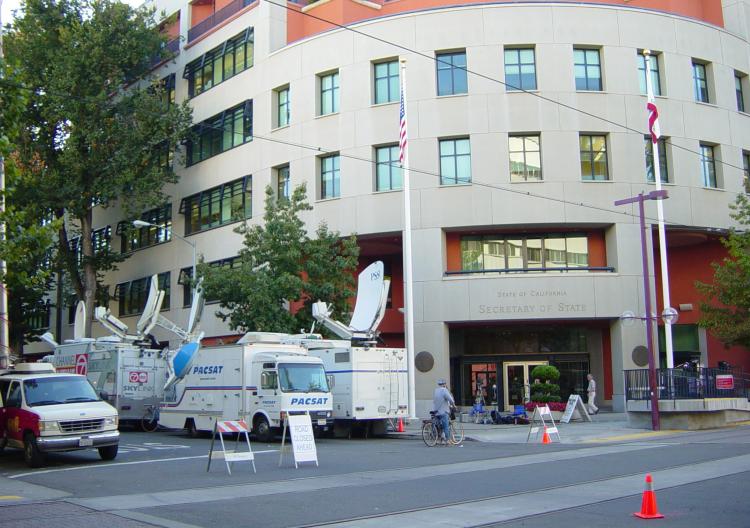
March Fong Eu, then a member of the California Assembly, smashes a toilet with a sledgehammer during a 1969 protest against paid toilets. (UC Berkeley Bancroft Library photo)
March Fong Eu was something of a rarity among politicians in that she had the ability to bring different people and competing ideas together.
So, it’s no surprise that, on Monday, the UC Berkeley graduate who brought the many pieces of the California Secretary of State’s office together under one roof is having that Sacramento building named after her. The March Fong Eu Secretary of State Building at 1500 11th Street will be the first state building named after a woman.
Eu, who died at age 95 in 2017, was the first Asian American in the country to serve in a state legislature. A Democrat, she was in the California Assembly for four terms, from 1966 to 1974, before being elected secretary of state, a position she held for five terms.
“When she was secretary, all the divisions of the secretary of state’s office hadn’t been under the same roof in decades,” Caren Daniels Lagomarsino, Eu’s longtime press spokesperson, says. “The building was a longtime goal of March Fong Eu. It’s kind of a shame she never got to work in it; during her time, the department was spread out over three different buildings.”
It was Eu’s idea to fund the building using money from state bonds, a process that has become more popular over time.
“When March was first elected, the office headquarters was located in rented space in old town, then rented space in the public market building,” says Michael Gagan, who worked for Eu in both the assembly and in the secretary of state’s office. “Jerry Brown, who had been secretary of state, was now the new governor.”
“At the first budget meeting we had with Jerry, she wanted to fund the state archives, to beef up the elections division and increase the staffing in the business division because we were backlogged there. Jerry was a penny-pincher, of course, and wasn’t sympathetic.”
Eu persisted, and over time she secured the funding.

On Monday, March 25, this building will be the March Fong Eu Secretary of State Building after the Berkeley alumna and former secretary of state. (Photo by Mav via Wiki Commons)
But the idea to name the building after Eu? That came from the current secretary of state, Alex Padilla. At Eu’s January 2018 memorial service in Oakland, Padilla was one of the featured speakers. After saying that Eu had been a trailblazer who’d enabled him, the son of Mexican immigrants, to become secretary of state, he said he would seek to put Eu’s name on the building.
“There was an audible gasp,” says Gagan, who will emcee Monday’s event. “It was such a nice gesture. All of us who worked for March thought it was a fabulous idea.”
The building opened in 1995, a year after Eu had been named ambassador to the Federated States of Micronesia by President Bill Clinton.
Lagamarsino, who worked as press secretary and later as elections chief, says having the state archives housed with the rest of the secretary of state’s departments was a driving force for Eu.
“She had a special fondness for the state archives,” she says. “That’s where all this rich history is stored and is accessible to the public. You can find all the legislative history of all the bills passed; you can see what the legislative intent was. There are census reports, trademarks and a wide variety of information.”
Although the secretary of state’s office is most commonly linked to elections, managing the voting process is just part of the workload. Corporations, limited partnerships and limited liability companies all have to register with the office. All notary publics report to the secretary of state. The office also is charged with monitoring who is contributing to campaigns and candidates and who is lobbying the state government.
Eu gained some national notoriety after taking a sledgehammer to a toilet on the steps of the state capitol toward the end of her time in the assembly. She campaigned to ban pay toilets from public buildings, which she said symbolized secondhand status for women when there was no charge at urinals. Although she took grief from her male colleagues, Eu won the day when Gov. Ronald Reagan signed a bill banning pay toilets in public buildings in 1974.
During her two decades as secretary of state, Eu was credited with introducing California to voter registration by mail, allowing voter registration to take place at the Department of Motor Vehicles, providing absentee ballots to any voter requesting one and including candidate statements in ballot pamphlets.
Eu was enough of a unifier that, in the election of 1978, the Democrat carried every county in the state, even traditionally Republican areas like Orange County.
“What made her effective is that she didn’t easily take `no’ for an answer,” Lagomarsino says. “She would always find another way around. She went into negotiations with good ammunition. She’d put down any arguments with facts and lack of emotion. She’d be able to say what would happen and who would benefit. She was charming and doggedly determined through it all.”